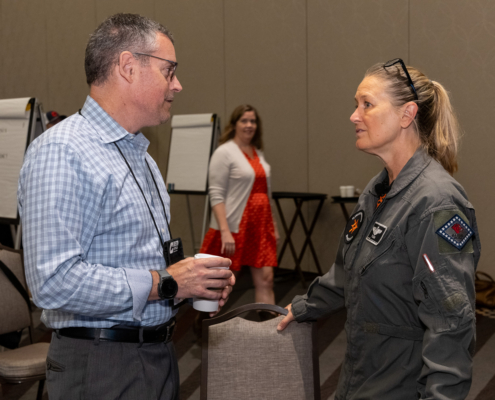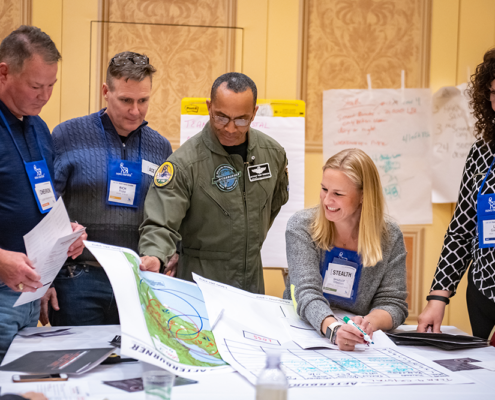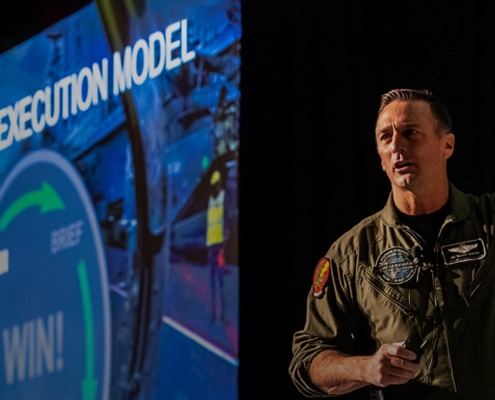 https://www.afterburner.com/wp-content/uploads/2024/11/High-Impact-Leader-Crete2024Summit-677-scaled.jpg
1707
2560
Ansley Anchors
/wp-content/uploads/2024/07/Afterburner-Logo-Resize-Fullcolor-300x93.png
Ansley Anchors2024-11-05 10:52:592024-11-20 14:55:53The Top 5 Attributes of a High-Impact Leader
https://www.afterburner.com/wp-content/uploads/2024/11/High-Impact-Leader-Crete2024Summit-677-scaled.jpg
1707
2560
Ansley Anchors
/wp-content/uploads/2024/07/Afterburner-Logo-Resize-Fullcolor-300x93.png
Ansley Anchors2024-11-05 10:52:592024-11-20 14:55:53The Top 5 Attributes of a High-Impact Leader
Considering the Cost of Mindlessness
It has been 26 years since the publication of Ellen J. Langer’s groundbreaking work, Mindfulness. Although powerful in its impact upon the management and cognitive sciences, few leaders have even a simple understanding of what mindfulness can mean to them in building successful teams. The challenge to understanding what mindfulness is rests, paradoxically, in understanding what it is not – mindlessness. Until leaders and their teams are able to recognize how often mindlessness inhibits creativity, stymies execution, and consumes productivity, they will not recognize just how powerful a mindful team can be.
When you stop and think about it – when you become mindful – we do some profoundly mindless things throughout the day. We drive to work and home without consciously recalling how we got there or any idea about what happened during our journey. We dutifully grind out our work day focused on any given task with little understanding of why or for what greater purpose we do it. Lamentably, we spend hours upon hours in meetings that end with no decision or course of action. We talk mindlessly as a team without focus. Thus, when the year ends, we wonder why it was that we did not achieve our annual goals and advance in a strategic way. Such is the cost of mindlessness.
Being mindful as a team, on the other hand, looks very different. Mindful teams have a bias for action. They interact frequently but efficiently to plan and perform tasks with purpose and focus. They do not waste time in endless meetings. Mindful teams understand the value of autonomy and accountability. As Langer pointed out, too much control, or what we often call micromanagement, inhibits mindfulness. “Highly specific instructions,” she writes, “encourage mindlessness. Once we let them in, our minds snap shut and do not let in new signals.” Since Langer’s early research, we have learned why this is true. Concentrated thought requires energy and, as evolutionary biology demonstrates, conservation of energy is a ubiquitous quality within living systems. Our minds are designed to be efficient rather than waste energy on routine tasks. Thus, we often behave mindlessly. It is rooted in our DNA. We take the well-worn path of habit even when such a path may be at odds with our goals or wasteful of our precious time.
One of the secrets to building more mindful teams is knowing what things require very little mindfulness and allowing them to be carried out with discipline and habit while setting aside more challenging cognitive tasks for the limited mental energy we have. These team building training strategies allow members of the team the freedom to choose, decide, and solve challenges on their own. Langer understood the value of individual accountability when she wrote, “If a manager is confident but uncertain – confident that the job will get done but without being certain of exactly the best way of doing it – employees are likely to have more room to be creative, alert, and self-starting.” Such is the foundation of mindfulness in teams.
Six Team Building Strategies for Building Mindful and Successful Teams
As our military and corporate experience has taught us, standards enable greater mindfulness by creating efficiency of mental effort. Through two decades of applying such team-oriented standard procedures through Flawless Execution programs and applications, the same lesson arises. Here are six ways you can create greater mindfulness and build a successful team:
- Develop and enforce standard operating procedures. When the routine tasks and operations of a team are codified, teams can relax their cognitive energy for routine tasks and direct it toward new and more complex challenges. With standards, teams don’t have to continually reinvent the wheel. But, standards and processes must be continually evaluated through experience and frequent debriefing.
- Develop checklists. Closely related to standards, checklists help prevent errors during the performance of mindless activity by reminding individuals of critical actions. Checklists should also engage other team members at appropriate points as a check on quality and accuracy. Mindless activity is often error-prone. Thus, a second pair of eyes can identify and prevent such errors.
- Plan according to a standard, collaborative process. When teams share a common and effective model for planning and decision making, they can get straight to the mindful effort needed rather than wasting time mindlessly chatting and struggling to reach consensus. Most important, however, teams must drive toward individual tasking and accountability – and no further! Let people figure out how to do things on their own.
- Brief plans to your team. Planning, when performed properly, is a mindful activity. Give the team a break afterward, but brief the completed plan to them in a formal way after the break. Good briefing techniques communicate details and accountabilities to refocus a team toward mindful execution.
- Hold frequent, short-but-focused “X-Gaps” during the execution of a plan. These are not meetings and have a singular objective, to identify in 15 minutes or less the execution shortcomings and emerging challenges in order for the team to address them and take mindful actions to keep the plan on track.
- Debrief successes and failures frequently. Turn learning from an occasional pursuit to a habit. The quarterly debrief, retrospective, after-action review, post-mortem or whatever you wish to call it, is too infrequent to develop a habitual commitment to learning. Continuous learning through frequent S.T.E.A.L.T.H. DebriefingSM is essential to mindfulness because it forces teams to concentrate on what’s happening and what they are doing in the here and now.
The term mindfulness has unfairly acquired a flavor relating it to new age spirituality. But, as outlined above, there are simple, concrete, and empirically-proven ways to developing more mindful, successful teams.
Share This Post
More Like This
 https://www.afterburner.com/wp-content/uploads/2024/11/High-Impact-Leader-Crete2024Summit-677-scaled.jpg
1707
2560
Ansley Anchors
/wp-content/uploads/2024/07/Afterburner-Logo-Resize-Fullcolor-300x93.png
Ansley Anchors2024-11-05 10:52:592024-11-20 14:55:53The Top 5 Attributes of a High-Impact Leader
https://www.afterburner.com/wp-content/uploads/2024/11/High-Impact-Leader-Crete2024Summit-677-scaled.jpg
1707
2560
Ansley Anchors
/wp-content/uploads/2024/07/Afterburner-Logo-Resize-Fullcolor-300x93.png
Ansley Anchors2024-11-05 10:52:592024-11-20 14:55:53The Top 5 Attributes of a High-Impact Leader https://www.afterburner.com/wp-content/uploads/2024/09/fighter-jet-performing-quick-ariel-maneuver.jpeg
1280
1920
Nate Riggins
/wp-content/uploads/2024/07/Afterburner-Logo-Resize-Fullcolor-300x93.png
Nate Riggins2024-01-02 19:53:032024-11-20 14:55:544 Ways to Boost Your Team’s Morale and Hit Your Revenue Targets
https://www.afterburner.com/wp-content/uploads/2024/09/fighter-jet-performing-quick-ariel-maneuver.jpeg
1280
1920
Nate Riggins
/wp-content/uploads/2024/07/Afterburner-Logo-Resize-Fullcolor-300x93.png
Nate Riggins2024-01-02 19:53:032024-11-20 14:55:544 Ways to Boost Your Team’s Morale and Hit Your Revenue Targets https://www.afterburner.com/wp-content/uploads/2024/09/Group_Meeting_2-1.jpeg
1707
2560
Nate Riggins
/wp-content/uploads/2024/07/Afterburner-Logo-Resize-Fullcolor-300x93.png
Nate Riggins2024-01-02 18:26:092024-11-20 14:55:54Fueling Business Agility: The Strategic Pivot
https://www.afterburner.com/wp-content/uploads/2024/09/Group_Meeting_2-1.jpeg
1707
2560
Nate Riggins
/wp-content/uploads/2024/07/Afterburner-Logo-Resize-Fullcolor-300x93.png
Nate Riggins2024-01-02 18:26:092024-11-20 14:55:54Fueling Business Agility: The Strategic Pivot https://www.afterburner.com/wp-content/uploads/2024/09/airborn-fighter-jet-using-afterburners-1.jpeg
1080
1920
Nate Riggins
/wp-content/uploads/2024/07/Afterburner-Logo-Resize-Fullcolor-300x93.png
Nate Riggins2024-01-02 18:19:252024-11-20 14:55:55Combat Distractions and Boost Your Revenue – Fighter Pilot-Style
https://www.afterburner.com/wp-content/uploads/2024/09/airborn-fighter-jet-using-afterburners-1.jpeg
1080
1920
Nate Riggins
/wp-content/uploads/2024/07/Afterburner-Logo-Resize-Fullcolor-300x93.png
Nate Riggins2024-01-02 18:19:252024-11-20 14:55:55Combat Distractions and Boost Your Revenue – Fighter Pilot-Style https://www.afterburner.com/wp-content/uploads/2024/09/jamie-street-_94HLr_QXo8-unsplash-1.jpeg
1380
2048
Nate Riggins
/wp-content/uploads/2024/07/Afterburner-Logo-Resize-Fullcolor-300x93.png
Nate Riggins2024-01-02 15:02:302024-11-20 14:55:553 Steps New Leaders Must Include in Their Strategic Planning Process
https://www.afterburner.com/wp-content/uploads/2024/09/jamie-street-_94HLr_QXo8-unsplash-1.jpeg
1380
2048
Nate Riggins
/wp-content/uploads/2024/07/Afterburner-Logo-Resize-Fullcolor-300x93.png
Nate Riggins2024-01-02 15:02:302024-11-20 14:55:553 Steps New Leaders Must Include in Their Strategic Planning Process https://www.afterburner.com/wp-content/uploads/2024/09/team-looking-at-map-to-focus-on-improving-teamwork-in-the-workplace-1.png
667
1000
Nate Riggins
/wp-content/uploads/2024/07/Afterburner-Logo-Resize-Fullcolor-300x93.png
Nate Riggins2024-01-02 03:00:272024-11-20 14:55:554 Tips for Improving Teamwork in the Workplace
https://www.afterburner.com/wp-content/uploads/2024/09/team-looking-at-map-to-focus-on-improving-teamwork-in-the-workplace-1.png
667
1000
Nate Riggins
/wp-content/uploads/2024/07/Afterburner-Logo-Resize-Fullcolor-300x93.png
Nate Riggins2024-01-02 03:00:272024-11-20 14:55:554 Tips for Improving Teamwork in the Workplace https://www.afterburner.com/wp-content/uploads/2024/09/planning-1.jpeg
933
1400
Nate Riggins
/wp-content/uploads/2024/07/Afterburner-Logo-Resize-Fullcolor-300x93.png
Nate Riggins2023-05-02 20:23:162024-11-20 14:55:58Using Brain Chemistry For Building High-Performance Teams
https://www.afterburner.com/wp-content/uploads/2024/09/planning-1.jpeg
933
1400
Nate Riggins
/wp-content/uploads/2024/07/Afterburner-Logo-Resize-Fullcolor-300x93.png
Nate Riggins2023-05-02 20:23:162024-11-20 14:55:58Using Brain Chemistry For Building High-Performance Teams https://www.afterburner.com/wp-content/uploads/2024/09/afterburner-banner-image-ceo-jim-murphy-giving-a-presentation_crop-1.jpeg
784
1920
Nate Riggins
/wp-content/uploads/2024/07/Afterburner-Logo-Resize-Fullcolor-300x93.png
Nate Riggins2022-11-14 21:30:142024-11-20 14:55:58What If Your Teams Were Truly High Performing?
https://www.afterburner.com/wp-content/uploads/2024/09/afterburner-banner-image-ceo-jim-murphy-giving-a-presentation_crop-1.jpeg
784
1920
Nate Riggins
/wp-content/uploads/2024/07/Afterburner-Logo-Resize-Fullcolor-300x93.png
Nate Riggins2022-11-14 21:30:142024-11-20 14:55:58What If Your Teams Were Truly High Performing?
Top Three Threats to Employee Morale in Today’s Economy
Business Culture, Leadership, Motivation, Team BuildingAbout Us
Building Strong Teams Through the Guidance of Fighter Pilot Keynote Speakers.

